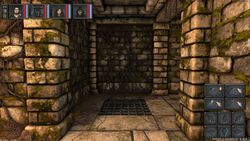Q&A with Wizardry 8 developer Lee Haneman at Night Dive Studios
Q&A with Wizardry 8 developer Lee Haneman at Night Dive Studios
Interview - posted by Infinitron on Wed 30 October 2013, 14:59:00
Tags: Nightdive Studios; Sir-Tech; Wizardry 8As you may know, the enigmatic Stephen Kick of Night Dive Studios recently arranged for the rerelease of the latter three Wizardry titles on Steam. Earlier this month, Night Dive conducted a short Q&A session with Wizardry 8 artist Lee Haneman on their Facebook page. I'll quote some of his more interesting answers here.
On the game's distribution problems and subsequent commercial failure:
On team sizes in the good old days:
On Wizardry 8's secret "retro" dungeons and what they could have been:
On the game's distribution problems and subsequent commercial failure:
"When Wizardry 8 came out, online digital distribution was not an option. Steam didn't exist yet. Online retailers were just starting out, and were not a viable option. In fact, the majority of people were still using dial-up to access the internet on 56k modems! For people to purchase your game, you needed to be in a retail store. To be in a retail store, you needed a publisher. Unfortunately in Sir-Tech Canada's case, they couldn't find one for North America initially, so they ended up self publishing through and exclusive agreement with EB Games for a period of time. This really hurt sales, and consequently contributed to the closure of the studio. It would have been interesting to see how Wizardry 8 would have fared back then if online distribution existed as it does today."
On team sizes in the good old days:
"Team sizes have grown exponentially over the years. On Wizardry 8, there were about 30 people on the team at its peak. In comparison, the last project I worked on at EA (Army of Two: The Devil's Cartel), had around 300 people on it towards the end of production. Another interesting fact is that Wizardry 8 provided gamers with 100+ hours of gameplay, while Ao2 took less than 10 hours to complete. Some of the larger blockbuster games can even have around 1000 people working on them (Assassin's Creed IV and GTA V for example). With such large team sizes, it means that the games have to sell millions of copies just to break even; which is why you see very little risk and innovation with those titles.
On a small team, such as the one we had on Wizardry 8, everyone had the opportunity to wear many hats and contribute to larger portions of the game. For example, everyone contributed towards the design. We didn't even have a fully dedicated designer on the project! As a team, we trusted and respected one another. Everyone's strengths were utilized to their fullest. The end result was a game that felt like it had a 'soul', and a team that could feel proud of each other and their accomplishments.
On the other hand, working within a larger team is not nearly as rewarding. Your role becomes so specialized that you feel segregated from other disciplines. Some individuals even develop a sense of fear and a 'territorial competitiveness' that is simply not conducive to proper game development.
I feel this is partially why we're seeing such a strong movement back towards smaller and independent game development teams."
On a small team, such as the one we had on Wizardry 8, everyone had the opportunity to wear many hats and contribute to larger portions of the game. For example, everyone contributed towards the design. We didn't even have a fully dedicated designer on the project! As a team, we trusted and respected one another. Everyone's strengths were utilized to their fullest. The end result was a game that felt like it had a 'soul', and a team that could feel proud of each other and their accomplishments.
On the other hand, working within a larger team is not nearly as rewarding. Your role becomes so specialized that you feel segregated from other disciplines. Some individuals even develop a sense of fear and a 'territorial competitiveness' that is simply not conducive to proper game development.
I feel this is partially why we're seeing such a strong movement back towards smaller and independent game development teams."
On Wizardry 8's secret "retro" dungeons and what they could have been:
"Another part of development on Wizardry 8 that was very rewarding to me, was actually the retro dungeons. For those that may not know, there are 3 secret 'retro' styled dungeons that you can discover in the game. James (the lead level artist) and I were chatting one day, and I mentioned how cool it would be to create a retro-themed dungeon. We love easter eggs in games, and felt it would be a nice little treat for fans of the classic Wizardry games. Others on the team really liked the idea as well, so we managed to squeeze it into the game despite the fact that we were nearing the end of production. If I recall, we may have had to convince Linda (the producer), that it could be done without jeopardizing any of the remaining work. It was meant to be a simple easter egg, but the dungeons ended up having some pretty epic monsters and loot, thanks to Charles (a writer and our 'monster wrangler'). Something else people may find interesting is that the original idea for the retro dungeons was to actually use the dungeon layouts from the original Wizardry: Proving Grounds of the Mad Overlord. Unfortunately, there were some potentially complicated legal issues related to that, so we wound up creating original layouts instead."
"Potentially complicated legal issues" indeed. I wonder if we'll see an end to them in our lifetimes.
There are 1 comments on Q&A with Wizardry 8 developer Lee Haneman at Night Dive Studios













